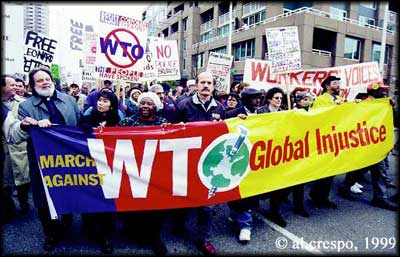Fortunately, the odious MAI treaty never came to pass: our friends the French evidently decided it was a bridge too far and blocked consensus in the OECD. But the whole "free trade" agenda continues unabated, right up to this week in Brazil. Recalibrating a "new deal on trade" is something candidate Obama once promised, and while the jury is still out, it's not looking good. Any kind of labor agreement with the bloodstained government of Columbia, in particular, is a cruel joke. It was popular outrage that helped kill MAI and Fast Track and Bush's dream of a hemispheric agreement. Concerted pressure needs to continue, though there are an awful lot of things to be outraged about these days.....
If you liked GATT and NAFTA, you're going to love the MAI. What's that? You haven't heard of the MAI? Well, to put it in a nutshell, MAI is a power grab so blatant that it makes GATTFTA look like a worker's cooperative in the Spanish Republic. And to paraphrase Tom Tomorrow, isn't it a shame you have to find out about it from a cartoon newspaper?
The Multinationals Asskissing Initiative, er, sorry, the Multilateral Agreement on Investments, is currently being negotiated under the kind of secrecy usually reserved for nuclear disarmament talks. Of course, it helps that the mainstream media won't even mention MAI until it's too late to do anything about it. Apparently we ordinary citizens raised too much of a fuss over GATT and NAFTA. Gets in the way.
The MAI is, as one of its framers so cheerfully puts it, "the constitution for a single global economy." Or more accurately, it's a Bill of Rights for global corporations. The MAI is designed to remove all barriers to the free flow of capital – or production facilities – across international borders. It will completely cripple the rights of local, state and national governments to regulate multinational corporations. Most charmingly, it allows such corporations to sue any government over what it considers an "unreasonable regulation." There is no appeals process, and – surprise! – no reciprocal right on the part of governments to sue corporations.
This agreement would eliminate all restrictions on foreign ownership and investment in any signatory nation. It would dissolve all limits on capital flight and job flight. It would prevent nations from attaching any minimum requirements whatsoever on companies receiving public subsidies It would prevent any limitations on foreign ownership, whether of vital natural resources or strategic industries.
Under the MAI, multinationals could challenge any number of laws placing restrictions on their behavior, from living wage initiatives, to environmental regulations, to marketing restrictions on dangerous products like cigarettes or pesticides. Unlike GATT and NAFTA, the enforcement mechanisms will have real teeth in them, and remember, there are no appeals.
If you'd like to find out more about the MAI, you probably won't be able to depend on the corporate media to inform you. I'll post more information about it on my website, along with links to other pages that examine this outrageous hijacking of democracy. You might want to write to your favorite media outlets and ask why they haven't seen fit to inform you about the MAI, and be sure and alert your legislators to your opposition early and often.
The MAI is being negotiated by the US and the European Community, who will try to leverage it onto the developing world once they've fast-tracked and lame-ducked it through the US Congress. If the past is any guide, they'd rather you just ignored the whole thing.

No comments:
Post a Comment